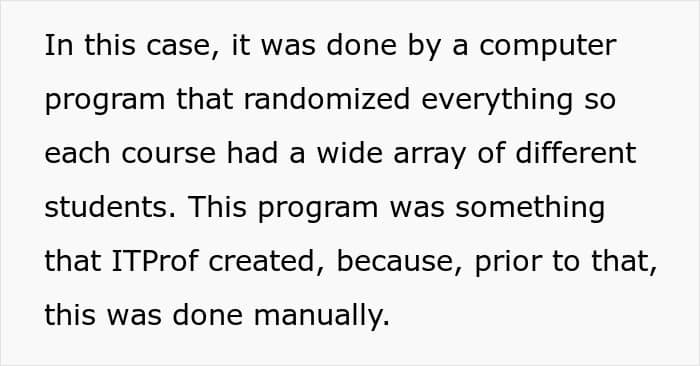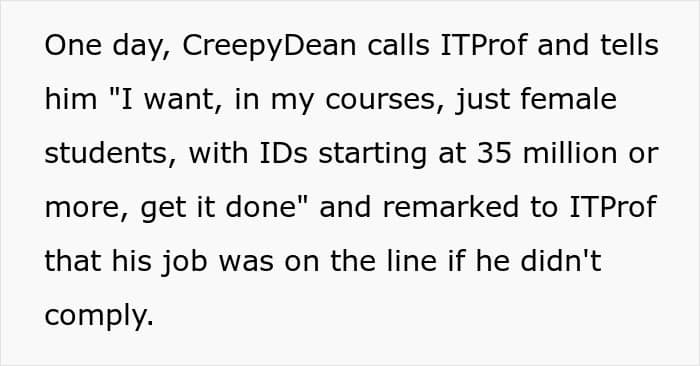Having a boss who is a bit of a creep is a pretty terrible experience no matter how you spin it. There might be demands, threats and other weird requests, with the implicit assumption that not complying might cost someone a job. But, every now and then, an employee might come across a golden opportunity to fight fire with fire.
A netizen shared a story of how a university IT worker maliciously compiled and got around the dean’s creepy request on who to assign to his class. We reached out to the person who shared the story via private message and will update the article when they get back to us.
RELATED:A creepy boss is a nightmare on the best of days

But one IT worker had a plan how to maliciously comply with a weird demand















There is a lot baked into our love of malicious compliance stories
There is something intrinsically gratifying about seeing someone comply with the very letter of a rule or requirement to showcase its absurdity or to punish its author, and that is the essence of our affection for malicious compliance tales. While ordinary acts of defiance would comply with the rule while violating the spirit, malicious compliance is a precise, almost surgical, following of the letter of the law or directive, nothing more, nothing less, so that the essence of the rule is overturned. This mixture of obedience and subversion achieves a form of narrative alchemy that turns ordinary workplace or everyday situations into moments of sly victory. We smile in admiration because we think we could outwit a nasty boss, a bureaucratic umpire, or an obnoxious customer with rules against their own interests.
The second powerful attraction is the dream of justice. We’ve all felt small and helpless confronted by someone in power who is being unreasonable to us. Malicious compliance stories offer us a means of gaining vicarious revenge. We see the worker diligently log each step, fill out each form to the letter as dictated, or obey each preposterous command to its logical conclusion, knowing that the complainer will get their comeuppance when the system freezes with self-created rigidity. There is a sense of cosmic retribution served when outrageous demands return on their creators, and that sense of moral retribution is richly rewarding.
Second is the pleasure of intellectual superiority. Connected to a sense of justice is the pleasure of intellectual superiority. These stories tease with wit and finesse rather than raw muscle or blatant disobedience. The enforcer must consider the rule, read all the clauses, and predict the consequences of strictly literal compliance. This mental exercise takes advantage of our own fondness for puzzles and problem-solving. We appreciate the ingenuity required to turn a rule into a sword, and we enjoy the moment when the trap springs on the rule-maker. In a world where hard problems do not always get neat solutions, malicious compliance offers an unambiguous, rational victory for the underdog.

Oftentimes, these experiences tap into classic narrative payoffs
There is also a communal aspect to such tales. They share anecdotes of inflated time sheets with infinitesimal increments in offices and internet forums, of email chains to thousands of people, or of safety protocols implemented with such diligence that work grinds to a halt. They share their own in order to build solidarity between people who suffer similar frustrations in strict hierarchies. Laughing together at the absurdity of bureaucracy or irritation of an irate client makes us not less isolated in our frustrations. It’s a means of saying, “We’ve all been there, and we know how to push back, without breaking rules.”
On a more fundamental level, malicious compliance enables us to play with the conflict between rules and human judgment. Rules are designed to introduce sameness, fairness, and safety, but in their excessive application, they can become a hindrance when enforced without sense or sensitivity. In pushing an enforcement of a rule to its limit, the “complier” and audience alike are reminded that policies are to serve the people, not the other way around. There is some kind of moral lesson behind every story: blind obedience is as devastating as absolute disregard for authority.
Finally, malicious compliance stories are amusing in themselves. They unfold in suspense as if with mounting tension as the employee follows each step with meticulous detail, ending with a climax when the consequences become indubitable. The joke is typically in the contrast between the employee’s phlegmatic, rule‑following nature and the growing anger or disgust of the rule‑maker. That timing for comedy, watching fastidious systems fall apart through their own inflexibility, is a uniformly fun show.
At the end of the day, malicious compliance is our affair of the heart with schadenfreude, intellectual jiu-jitsu, community building, and moral satire. These stories let us fantasize about a world in which the weak can resist arbitrary authority peacefully, but with wit, rule-bound rebellion. They remind us that rules are for us, and that using them just so can be the strongest form of revolt.
Readers thought the IT worker’s plan was brilliant











Some folks wanted more details



Others shared similar stories


